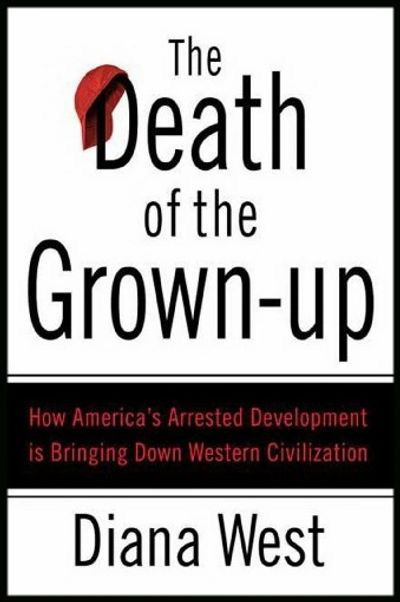Who Are the Real Adolescents?
How America's Arrested Development is Bringing Down Western Civilization
Columnist Diana West has a new book out that I hope is even half as good as its quotes. The book is called The Death of the Grown-Up: How America's Arrested Development is Bringing Down Western Civilization and, while the subtitle is perhaps overdramatic, her thesis is right on. If you read nothing else of this post, at least read this:
"Once, there was a world without teenagers. Literally, 'teenager,' the word itself, doesn't pop into the lexicon much before 1941. That means that for all but this most recent period of history, there were children and adults. Children in their teen years aspired to adulthood; significantly, they didn't aspire to adolescence. Certainly, men and women didn't aspire to remain teenagers.
Today, turning thirteen, instead of bringing children closer to an adult world, launches them into a teen universe. And due to the fold our culture has placed on the maturation process, that's where they're likely to find the adults. Most of us have grown up - or, at least, grown - into this new kind of adulthood, this perpetual adolescence so much the norm that it's difficult to recognize it as the profound civilizational shift that it is."
Ever heard the phrase "thirty is the new twenty" with regard to young adults getting married, having kids, and figuring things out in life? Ever wonder why teenagers try to act like adults while adults often act like teenagers? According to an interview with West, here may be part of the answer:
"The extent to which social and cultural distinctions between children and adults--who dress the same, all say 'cool,' and even watch cartoons--had disappeared. I began to realize I was witnessing at a personal level the same displays of perpetual adolescence in reluctant adults around me ('I'm too young to be called 'mister'') that I was observing in society at large. This led me to make all sorts of connections between the emergence of youth culture in the 1950s, its tantrums in the 1960s, the so-called culture wars that followed, the establishment of multiculturalism, the ascendance of non-judgmentalism and more."
More than anything, we in society (especially in the Church) need children to grow up into adults and then into real and true parents. This doesn't only mean physically and literally, but also emotionally and spiritually. Indeed, we have many people in the Church who are adults, but how many act like older and wiser parents who expect and aspire to be (and be viewed as) older and wiser? Again, West is insightful:
"The unprecedented transfer of cultural authority from adults to adolescents over the past half century or so has dire implications for the survival of the Western world. In other words, what I call the death of the grown-up is not just about sophomorically bad music or babyishly dopey movies (although it's about that as well). Having redirected our natural development away from adulthood and maturity in order to strike the pop-influenced pose of eternally cool youth - ever-open, non-judgmental, self-absorbed, searching for (or just plain lacking) identity - we have fostered a society marked by these same traits, which are usually associated with adolescence."
I'm ordering the book now.


